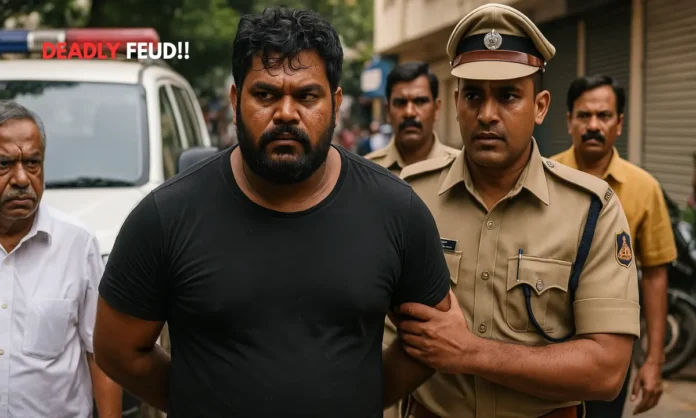Summary Box
- ‘Deadly’ Kiran arrested for the brutal murder of Shivakumar in Bharathinagar.
- Shivakumar’s mother alleges a property dispute and MLA’s indirect involvement.
- CID takes over investigation as police pursue two remaining absconding suspects.
A Murder Case Entwined with Political Controversy
In a shocking development, Bengaluru police arrested Kiran, infamously known as ‘Deadly Kiran,’ for his alleged role in the brutal murder of 40-year-old Shivakumar alias Biklu Shiva on July 15. The killing, which took place near Meanee Avenue Road in Bharathinagar, has sparked political controversy after the victim’s mother accused BJP MLA Byrathi Basavaraj of indirectly encouraging the assailants due to a property dispute.
Police investigations have revealed chilling details: CCTV footage reportedly shows Kiran stabbing Shivakumar “20 times” with a machete-like weapon, according to D Devaraja, Deputy Commissioner of Police (East). This arrest is the 16th in the case, following a week-long series of detentions that have brought the murder into sharp focus as both a criminal and political flashpoint.
#Breaking | Bone-chilling murder in Bengaluru
— TIMES NOW (@TimesNow) July 16, 2025
– A 46-year-old rowdy sheeter hacked to death
– BJP MLA & former mantri Byrathi Basavaraj has been booked
There are 4 other accused who have been named… The police are also looking at Byrathi Basavaraj's role in abetment to this… pic.twitter.com/NyRljkhckY
‘Deadly’ Kiran’s Criminal Trail
- Known as a history-sheeter at the Malur police station in Kolar.
- Previously linked to the contract killing of a gram panchayat member.
- Identified as the prime executioner in Shivakumar’s murder.
Kiran’s arrest is a significant breakthrough in a case that has gripped Bengaluru, given his reputation and previous criminal activities. Police confirm that two more suspects, Danush and Jagadeesh alias Jaggi, remain at large. Efforts are underway to track them down, with multiple teams deployed across Karnataka and adjoining states.
Byrathi Basavaraj’s Political Quandary
- MLA questioned twice by police amid allegations of indirect involvement.
- Denies all accusations, pledging full cooperation with law enforcement.
- CID steps in to ensure an impartial probe.
The murder has cast a shadow over BJP MLA Byrathi Basavaraj, with opposition parties demanding transparency and accountability. While Basavaraj has maintained his innocence, public scrutiny has intensified as the case’s complexity deepens. The transfer of the case to the CID underscores its political sensitivity, ensuring a detailed and independent investigation.
Impact and the Road Ahead
- CID investigation expected to expand into the property dispute claims.
- Family of the victim demands swift justice and protection from intimidation.
- The case highlights Karnataka’s ongoing struggle with urban crime and political nexus.
As the probe progresses, the Shivakumar murder case has become emblematic of larger concerns surrounding law enforcement and political influence in Bengaluru. With two prime suspects still on the run and the CID delving deeper into the property dispute allegations, the coming weeks are likely to bring significant revelations.
The Final Verdict
The arrest of ‘Deadly’ Kiran marks a crucial turning point in the Shivakumar murder case, but the investigation is far from over. With two key suspects—Danush and Jagadeesh—still absconding, and the case’s transfer to the CID, the probe is poised to dig deeper into allegations of political influence and property disputes that have amplified public outrage.
BJP MLA Byrathi Basavaraj’s repeated questioning highlights the political undertones of the case, though no direct evidence against him has been established yet. The CID’s involvement is expected to ensure transparency, but the episode has already raised significant questions about Bengaluru’s crime-politics nexus and the adequacy of law enforcement in curbing violent organized crime.
For the victim’s family, justice hinges not just on arrests but on a swift and impartial trial. The broader implications of this case—ranging from property conflicts to political credibility—will continue to shape public discourse in Karnataka in the days to come.


